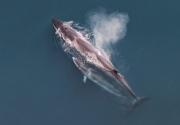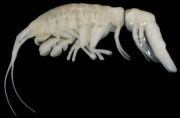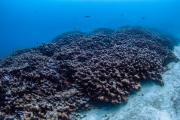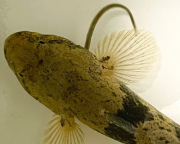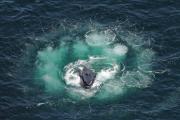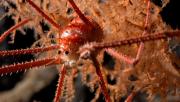Have you ever heard of “mosquito ringtones”? They’re phone ringtones that teens can easily hear but the frequency is too high for adults to hear, since humans naturally start losing the ability to hear higher frequencies in their 20s. New research suggests that some whale species use a similar trick—for very different reasons. Instead of trying to hide the sound of a ringing phone from adults, some whales call at frequencies too low for predators to hear.
Articles
The Marine Science Institute's monthly column, Science and the SeaTM, is an informative and entertaining article that explains many interesting features of the marine environment and the creatures that live there. Science and the SeaTM articles appear monthly in one of Texas' most widely read fishing magazines, Texas Saltwater Fishing, the Port Aransas South Jetty newspaper, the Flour Bluff News, and the Island Moon newspaper. Our article archive is available also on our website.
One of the most famous symbiotic relationships in the animal kingdom is the clownfish and its anemone. Symbiosis is the close association between two different species where at least one benefits from the arrangement. Scientists have long known the advantages clownfish and anemones offer one another, but one mystery has stumped them for a century: How do clownfish avoid getting stung by the nematocysts, or stinging cells, on an anemone’s tentacles, which it uses to catch its prey?
If you thought dating other humans was complicated, wait until you hear about the complex courtship behaviors of wild leopard seals. These apex predators are the second largest Antarctic seal species after southern elephant seals. At 8 to 11 feet long and weighing up to 1,300 pounds, their only natural predators are orcas. These ice-loving pinnipeds are notoriously difficult to study, but a team of researchers led by a Baylor University biologist managed to observe a two-hour courtship interaction between a male and female in Laguna San Rafael, Chile.
It’s harder to imagine a more hostile environment on Earth than the ocean’s hadal zone. Named after Hades, the Greek god of the Underworld, the hadal zone is the deepest part of the ocean, located about 3.7 to 6.8 miles below sea level in marine trenches. Not only is it pitch black, but the organisms living there must withstand intense pressure, which also makes it challenging for researchers to explore. It’s no wonder that scientists know so little about the creatures that manage to survive in these conditions.
When Pinocchio and his father, Geppetto, were swallowed by a whale, they started a fire to make the whale sneeze them out. That’s not exactly the strategy that juvenile Japanese eels use, but the eels have managed to find a way to escape the stomachs of predators that swallow them—and biologists have captured their Houdini-like feats on video.
Sea otters, dolphins, crows, elephants, octopuses, crocodiles—these animals, like humans, use tools for a variety of activities, from eating and drinking, to grooming and play, to combat and communication. But far fewer animals are known to manufacture and modify the tools, rather than simply using what they come across in their environment. And now, humpback whales are part of this much smaller group of “tool wielders.”
From the front, dragonfish look about as terrifying as their mythological namesakes likely appeared to the knights in ancient tales. Sleek, slender, and quite small at about 20 inches long, they don’t really resemble dragons, but their gaping jaws full of fangs are scary enough to seem like a storybook monster. They also live deep in the dark twilight and midnight zones of the sea, where their dark skin allows them to remain unseen so they can ambush their prey.
With thousands of species of the world’s organisms yet to be discovered, it’s not unusual for scientists to discover several new ones on a lengthy oceanic expedition. But it’s far less common for a single expedition to discover more than 100 new species, as one group estimates it did earlier this year while exploring seamounts along the west coast of South America.
During bicycling races, cyclists often ride close together to take advantage of drafting, where a low-pressure area created behind a cyclist gives a boost to the one following them so the whole group can expend less energy. While the dynamics of ocean currents underwater are a bit different from air currents, it turns out that a similar strategy can help fish in turbulent water. New research has revealed that fish can swim far more easily, and use much less energy, swimming together in a school than battling the currents on their own.

